All Academic Programs and Administrative Units conduct assessment annually.
Academic Programs
Student Learning Outcomes Assessment for educational programs occurs every academic year. Program heads conduct learning outcomes assessment throughout the year and compile a summary of the process into an assessment report, which is due May 15 each year (the last day of faculty contracts). Faculty may choose to report their assessment results over an academic year or a calendar year. Program Heads are expected to submit assessment reports the Vice President of Academic Affairs and to the Director of Institutional Effectiveness. The Division Dean ensures that the program heads submit reports by the deadline and that the reports are complete. The Director of Institutional Effectiveness reviews the reports, and works throughout the year with faculty to improve the assessment process, clarify information within the report, and strengthen the overall quality of the assessment process and ensuing report.
Assessment Resources for Academic Programs
What to include and how to structure the report
Academic Program Assessment Report Outline PDF
Assessment Report Template DOCX
Tips for writing a report and an example of a completed report
Assessment Report Writing PPT
Assessment Report Example PDF
Standards for assessment quality
Assessment Evaluation Rubric 1.0 PDF
Title General Education Assessment
MGCC General Education assesses six competencies and associated student learning outcomes:
Civic Engagement is the ability to contribute to the civic life and well-being of local, national, and global communities as both a social responsibility and a life-long learning process. Degree graduates will demonstrate the knowledge and civic values necessary to become informed and contributing participants in a democratic society.
Critical Thinking is the ability to use information, ideas and arguments from relevant perspectives to make sense of complex issues and solve problems. Degree graduates will locate, evaluate, interpret, and combine information to reach well-reasoned conclusions or solutions.
Professional Readiness is the ability to work well with others and display situationally and culturally appropriate demeanor and behavior. Degree graduates will demonstrate skills important to transition into the workplace and pursuit of further education.
Quantitative Literacy is the ability to perform accurate calculations, interpret quantitative information, apply and analyze relevant numerical data, and use results to support conclusions. Degree graduates will calculate, interpret, and use numerical and quantitative information in a variety of settings.
Scientific Literacy is the ability to apply the scientific method and related concepts and principles to make informed decisions and engage with issues related to the natural, physical, and social world. Degree graduates will recognize and know how to use the scientific method, and to evaluate empirical information.
Written Communication is the ability to develop and communicate ideas effectively in writing as appropriate to a given context, and audience. Degree graduates will express themselves effectively in a variety of written forms.
Given the similarities in the four Transfer program curricula, one assessment report is compiled for all programs and is called the General Education Assessment Report. The General Education program assesses learning outcomes on a cyclical basis, so that only two outcomes are assessed each year, but all six outcomes are assessed at least every three years.
General Education Assessment Reports
- General Assessment Report 2017
- General Assessment Report 2018
- General Assessment Report 2019
- General Assessment Report 2020
- General Assessment Report 2021
- General Assessment Report 2022
- General Assessment Report 2023
- General Assessment Report 2024
Administrative Units
Directors/Vice Presidents who oversee offices, departments, and divisions are responsible for completing an assessment report every year. Unit directors and division vice presidents develop yearly measurable outcomes that align with departmental goals and incorporate appropriate President’s Goals. Together, these goals and outcomes form the foundation for determining institutional effectiveness. These goals and outcomes are used to establish an assessment plan, which is due by late September. Initial findings from the plans should be identified by March 15th in time for budget requests to be informed by assessment data. Because other data are not collected until the end of the academic year, a final assessment report is due by May 31st.
The Assessment Report is submitted to the respective unit director’s Vice President, or, in the case of the Division Vice Presidents, the reports are sent to the President. Unit directors take the summer months to incorporate annual institutional initiatives into their planning processes, incorporate changes based on the prior year’s results, and develop new departmental outcomes. Unit directors and supervisors then meet to discuss the previous year’s reports and plans for the next year by late September.
Assessment Resources for Administrative Units
What to include and how to structure the report
Assessment Plan Template I DOCX
Assessment Plan Template III DOCX
Tips for writing a report and an example of a completed report
Assessment Report Example I PDF
Assessment Report Example II PDF
Assessment Report Example III PDF
Standards for assessment quality
Assessment Evaluation Rubric 1.0 PDF
Enrollment
Unduplicated headcount

Completions
Displays completions by degree level, gender, institution sector and reporting year. Data is derived from SCHEV's degree conferred data file (annual).

Completions by Race/Ethnicity
Displays completions by degree level, gender, race/ethnicity, institution, institution sector and reporting year. Due to small counts, Native Hawaiian or Other Pacific Islander (NH) was reported under the Asian (NH) race/ethnicity category. NH: Not Hispanic or Latinx. Data are derived from SCHEV's degrees conferred file (annual).
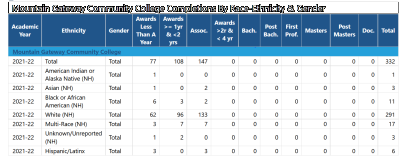
Retention & Graduation
Public 2-Year Graduation Rates
Earned Associate’s Degree within 3 Years, by cohort. 1994-Present
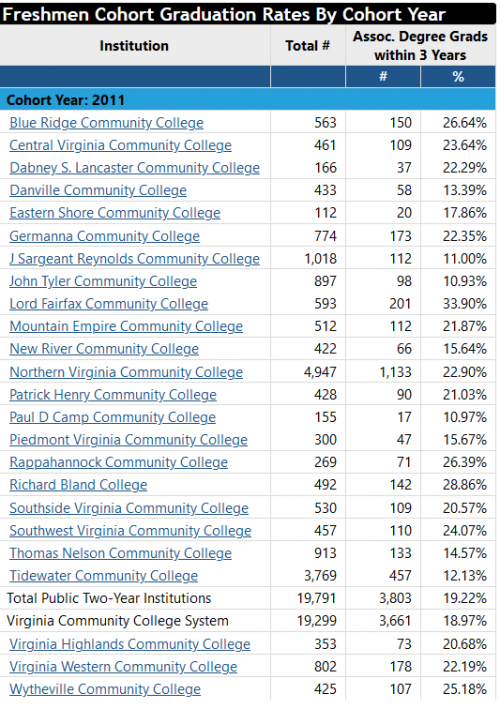
Student Success Index
The Student Success Index (SSI) provides a wholistic view of student success that goes beyond the narrow definition of the IPEDS Graduation Rate Survey (GRS) which is based on students entering as first-time in college with full-time enrollment at entry. The SSI includes part-time and transfer students and provides varying amounts of time to complete a degree or continue enrollment to be counted as success. Please note that not all sub-cohorts are available for all institutions. This is particularly true for sub-cohorts based on course enrollments or credits earned. For most of the history of the SCHEV student-level collections, private institutions did not submit course enrollment detail.
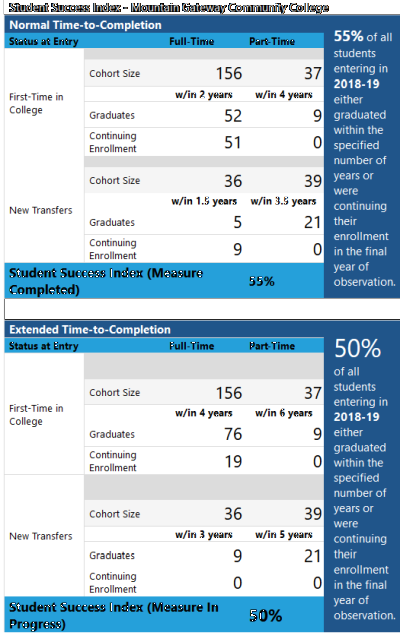
Enrollment and Completion of Under-represented Populations
Distribution and Completion of Under-represented Populations
Note: The Pell counts shown in this report - Distribution and Completion of Under-Represented Populations - are not comparable to the Pell counts displayed in the FA09: Pell Grant report (FA09). This report captures undergraduates who received a Pell grant at any time during the last five-years, while the FA09 report only captures undergraduates who received a Pell grant for the year selected. Traditionally Under-Represented Populations of Students are defined with the following characteristics:
- Race: Non-white US citizen and permanent residents
- Pell: Students receiving Pell grants at any time during the last five-years
- Age: Non-traditional students: age 25 or older at entry
- VA Localities: Students from Virginia localities in the lowest quintile of associate and baccalaureate attainment rates
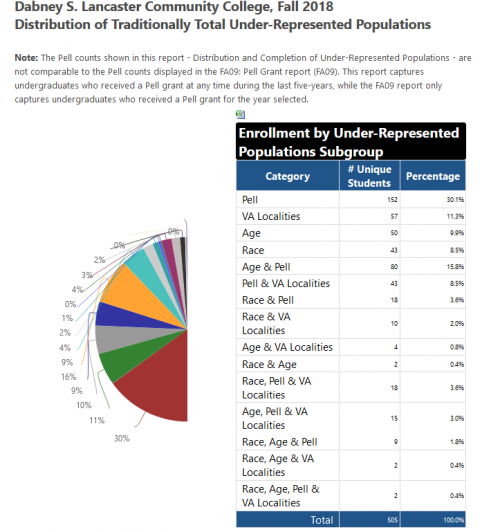
Fall Term Enrollment by Race/Ethnicity
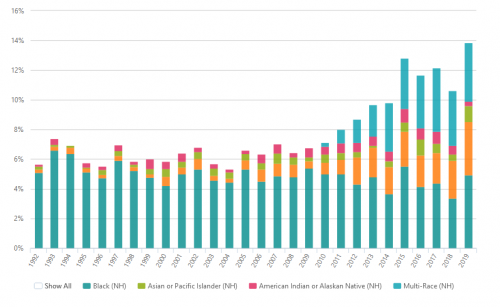
Financial Aid and Debt
Pell Grant Report
Pell Grant recipients, total award, average award, and percentage of fall students receiving awards.
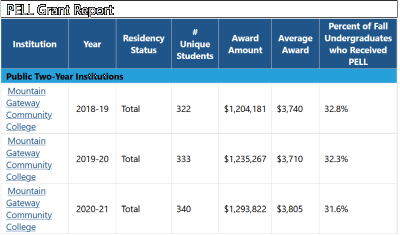
MGCC Data Trends Related to Under-Represented Populations
Other Assessment Resources
NC State University has one of the most comprehensive websites for online assessment resources. If you are interested in learning more about assessment in order to improve student learning, check out their assessment resources.